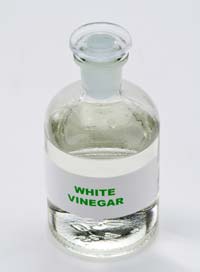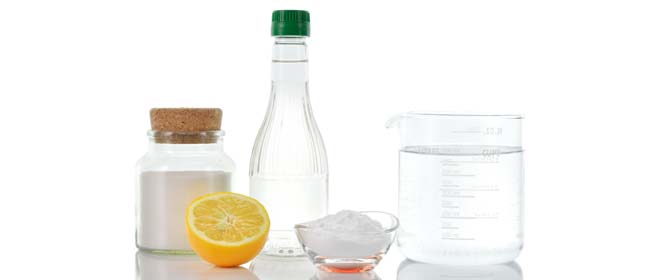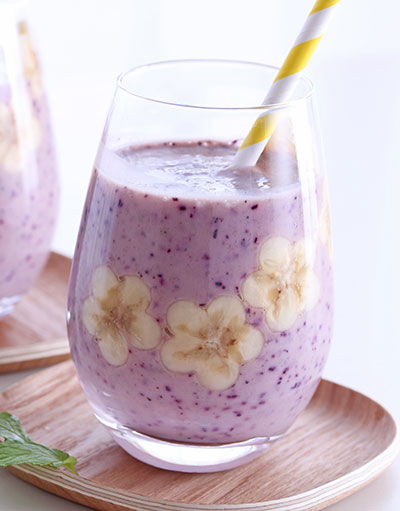Confused which vinegar is best used for what? Differencebetween.net explains the difference between the two. Reprinted with permission.
Try to look for vinegar in a local market and you would be surprised just how many kinds there are. There is a staggering 21 kinds of vinegar available commercially. That is excluding the countless home-made types. But out of the omnifarious range, distilled vinegar and white vinegar prove to be two of the most widely used. Sure, they’re both acidic, but how different really are they from one another?
 Most people agree that the basic difference would be the level of purity. Simply put, distilled vinegar has been purified more than white vinegar. More than that, there are also dissimilarities when it comes to chemical structure, production and usage.
Most people agree that the basic difference would be the level of purity. Simply put, distilled vinegar has been purified more than white vinegar. More than that, there are also dissimilarities when it comes to chemical structure, production and usage.
White vinegar is sometimes also called spirit vinegar. Contrary to its name, it’s actually clear. It is usually produced from sugar cane. It is made by allowing sugar cane extract to go through acid fermentation. In the process, the liquid is oxidised, causing the chemicals in it to change and become more acidic.
Another way of making white vinegar is by combining acetic acid with water. This variation is much sourer than the naturally fermented type. It has 5% to 20% acetic acid content and is regarded to be stronger than any other types.
Distilled vinegar, also known as virgin vinegar, is made from just about any type, for instance rice, malt, wine, fruit, balsamic, apple cider, kiwifruit, rice, coconut, palm, cane, raisin, date, beer, honey, kombucha and many others. As its name suggests, it is distilled from ethanol. ‘Distilled’ plainly means that the liquid component is separated from the base mixture. This produces a colorless solution with nearly 5% to 8% acetic acid in water, relatively weaker than white or spirit vinegar.
Both white and distilled vinegar are used not only for cooking, but as well as for cleaning, baking, meat preservation, pickling, and sometimes even for laboratory and medicinal purposes.
Since white or spirit vinegar contains a higher percentage of acidic content, it is more ideal as a household cleaning agent. It provides an eco-friendly solution for eliminating dirt and bad odour on a wide array of materials like fabric, metal, glass, fur, tiles and many others. It can also be used as a urine-cleaner for pets, as well as a natural herbicide or weed killer. White vinegar does not contain ammonia; it thoroughly cleanses without leaving a strong and harmful smell.
Distilled vinegar, being the milder variation, is more suitable for cooking, flavouring, food additives and food preservation. Additionally, it can be used as a household remedy. For instance, it is an effective way to cure or prevent athlete’s foot and warts. It is also very helpful in relieving sunburn and prevents the skin from peeling or blistering.
Both white and distilled vinegar are available in the market. Some households produce their own by fermenting fruit juices, slightly akin to production of wine.
Summary
- White and distilled are types of vinegar. They differ fundamentally in their acetic acid content.
- White, also known as spirit vinegar, has 5% to 20% acetic acid. This is generally higher as compared to distilled vinegar’s 5%-8%.
- White is made by natural fermentation of sugar cane extract or by combining acetic acid with water. Distilled can be made from any time of vinegar, wherein more ethanol is separated from the base mixture.
- Both distilled and white can be used in cooking, cleaning, food preservation, and for medical and laboratory purposes. However, since white is stronger than its counterpart, it is more suitable for cleaning and disinfecting. Distilled vinegar, on the other hand, is better for cooking, flavouring, food preservation and as a natural home remedy.
 My Favourites
My Favourites











Very well explained
Thanks
I have a pickled onion recipe that uses both Balsamic and Distilled vinegar. Is Distilled available in New Zealand and if not what would you use in it’s place? Thanks
Hi Desiree
Check on the label to see if it is distilled. DYC White Vinegar is distilled.
Thank you for sharing this article on vinegar. I was out of white and had to use distilled in a recipe at the last minute, so you saved me a trip to the market, but that is not why I’m posting. This article is very well written, and the summary section at the end is a great feature. I have been Pinning articles to my Pinterest wall for years, & while most blog posts fall short in correct grammar, vocabulary, and structure, yours will proudly be pinned as the exception. Yes, I am an English teacher, and it always amazes me how many individuals post without having someone proof their page. You should be proud of the content as this is an excellent example of a compare & contrast paper to show students.
Thanks for the kind words, Corrine. 🙂
Except for the line…
“Distilled can be made from any time of vinegar, wherein more ethanol is separated from the base mixture.” … which jumped out at me. I too can’t believe the amount of articles posted on legitimately professional sources that haven’t been proof-read. I suppose it’s our blind dependence on the efficacy of our digital tools. Unfortunately, a program sees “time” as a legitimate word and won’t see it as inappropriate. Publications before the use of auto-correct and spell check, had far less spelling and grammatical errors. I suppose this has lowered the bar overall. find this to be true with books nowadays as well.
And no, I’m not an English teacher. Just someone who loves words.
Just like there is no such thing as ‘white chocolate’ and ‘red licorice (unless it has some anise extract in it)’, there is no such thing as the product called ‘White distilled vinegar’ or ‘distilled white vinegar’. Milk is white (and chocolate), but distilled vinegar is CLEAR AS WATER.
I’ve suggested many, many times that companies drop the ‘white’ and just call it ‘distilled vinegar’ but they seem to be stuck in a space/time warp somewhere. There is no such thing as white wine, either. It’s clear.
You contradicted yourself by saying “no such thing as white chocolate” then saying 2 lines down “Milk is white (and chocolate)”. Would love to know how the companies you TOLD to drop the White took it.
Anyway would not be without my White Chocolate and a bottle of SSB – white wine…
There was no contradiction, milk is white and milk is chocolate, why did that need explaining? There really isn’t such a thing as white chocolate because when it’s white it has no chocolate in it, it is made from the white part (the fat) of the cocoa bean, not the cocoa (or chocolate) part.
Oh for the love of Mike, I have met some pedants but this probably leads the band, I think you need to get out more, our language is full of such oddities, that doesn’t make the descriptions attached wrong, a rose by any other name would smell as sweet, we all know white chocolate is neither white nor chocolate, but that’s its name, it is used in a similar manner if you bake. Clear vinegar, well why call it vinegar at all? Why does it matter? All we need to know is that the product is what we mean by calling it that so that we don’t poison anyone, similar applies to every other inaccurate word or saying. My feeling is that your only interest is in using them as a wind up, I think it is a shame, our language deserves better respect, it has many odd ways and every day there are more added and incorrect use becomes part of every day use and part of it, take the phrase ” a lot of…..” a lot was used to mean a quantity, item, set, batch of something, we still see it used at auction, use to mean many items was slang, it has been accepted as part of our grammar for decades now, one of very many examples, that’s how language evolves. So take a deep breath and get over white vinegar (also known as spirit vinegar) and chocolate, they are valid and have been for many years as names, not meant as descriptions, but if you insist on going down that route why stop there? A mug is surely a drinks receptacle?
I am trying to find white vinegar 20% for killing off weeds without herbisides etc. Fishpond no longer has access to it, and I am desperate for that, rather than turning to salt.
Does anyone know where I may be able to purchase this.
Thanks
Walmart has cleaning vinegar which has a higher acidity level. At my walmart it’s in the cleaning section, other walmarts I have found it in with the other vinegars in grocery isle. ✨
I find mine at Lowes or home Depot and sometimes they are sold out because so many folks want it. They get more quickly
I was interested in the difference of the two because I believe that I get an allergic reaction ( angioedemia )
Around my face and lips, I can’t be sure but I have no
problems when I eat a food with distilled vinegar a
long as I don’t over do it. I have to ask which pickles
they use when I by hamburgers or hotdogs! Still can’t
find a definite trigger causing the reactions. Thanks, David
David,
I’m NOT a doctor, but someone close to me has a severe allergy to SULFITES which is commonly found in pickled foods, dried foods (such as prunes), and as a preservative in thousands of products (even some crackers). It is also naturally occurring in grapes and oranges, as well as others. If you are reacting to pickles, I would investigate this possibility, even if you’re just ruling it out for your own peace of mind.
All this is well and good, but I’m involved in something really important ,and I need to know what works the best ! I have a motorcycle that I am restoring , and there is rust crud in the fuel tank that I’m trying to clean out . I went to the market yesterday to buy some White Vinegar , cause I heard it was good for that sort of thing . I didn’t know about all the different kinds. I bought a gallon of distilled white vinegar that says in fine print “Diluted with water to 5% acidity” So my question is will this do the job or do I need to get some of that 20% acidity vinegar to do the deed ? Thank you for your help in advance !
In case you haven’t finished your tank yet, higher acid is better and drop in a couple handfuls of marble sized rocks and shake shake shake! Just make sure the rocks are not limestone based! Some small amount of sand can also abrade your rust nicely.
You do not need vinegar to derust a rusted spot. A sand paper will be good enough. Alternatively, use a kitchen sponge with the hard scrubbing side to sand the surface. After derusted, use toothpaste to polish up the sanded surface.
I think he means inside the tank. Can’t scrub there.
Can you use 1 cup distilled white vinegar to 1 gallon of water instead of regular white vinegar on your azaleas? I found a garden site that just says 1 cup white vinegar to 1 gallon water. It does not state if distilled can be use and get the same result. Thank you for clearing up this question.
I’m sure that would be fine, Joanna.
Try it and see what happens, distilled isn’t as strong. Let us know?
I tried to buy some whiite vinegar for a cleaning job on oxydising brass buttons… went into Sainsburys, Asda and Tesco… none of them sell it or had ever heard of it! Any ideas where to purchase and why do the major stores not sell it?
Sorry Dave, I’m not based in your country. I’m surprised the supermarkets don’t sell it though. It is a very common item. Maybe try one of your DIY stores. I just did a quick search online. Does this help? https://inthewash.co.uk/cleaning/where-to-buy-white-vinegar-for-cleaning-in-the-uk/
Just go to the shelf where the vinegars are, you will find white vinegar there, failing that, your local chip shop will most likely have it. Staff might have been thrown by the mention of cleaning brass buttons. You can use malt vinegar.
“dissimilarities when it comes to chemical structure”? I don’t think so, The core substance is chemically exactly the same.
Which vinegar is best to combine with Bicarb of Soda for science experiments with children?